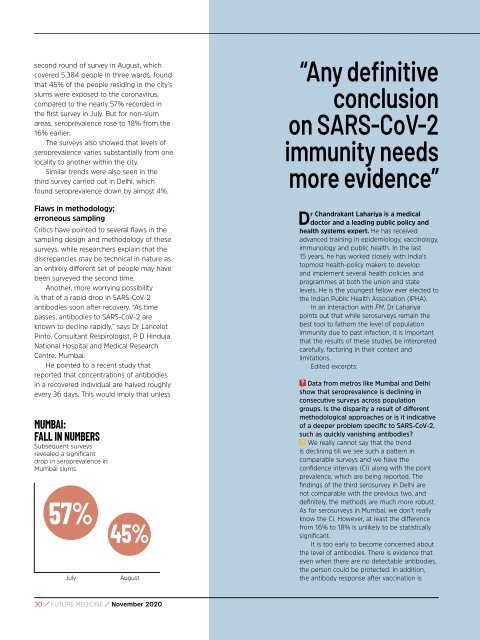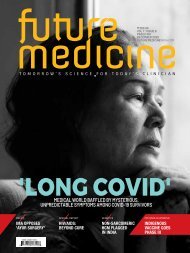FM November2020 Digital P
You also want an ePaper? Increase the reach of your titles
YUMPU automatically turns print PDFs into web optimized ePapers that Google loves.
second round of survey in August, which<br />
covered 5,384 people in three wards, found<br />
that 45% of the people residing in the city’s<br />
slums were exposed to the coronavirus,<br />
compared to the nearly 57% recorded in<br />
the first survey in July. But for non-slum<br />
areas, seroprevalence rose to 18% from the<br />
16% earlier.<br />
The surveys also showed that levels of<br />
seroprevalence varies substantially from one<br />
locality to another within the city.<br />
Similar trends were also seen in the<br />
third survey carried out in Delhi, which<br />
found seroprevalence down by almost 4%.<br />
Flaws in methodology;<br />
erroneous sampling<br />
Critics have pointed to several flaws in the<br />
sampling design and methodology of these<br />
surveys, while researchers explain that the<br />
discrepancies may be technical in nature as<br />
an entirely different set of people may have<br />
been surveyed the second time.<br />
Another, more worrying possibility<br />
is that of a rapid drop in SARS-CoV-2<br />
antibodies soon after recovery. “As time<br />
passes, antibodies to SARS-CoV-2 are<br />
known to decline rapidly,” says Dr Lancelot<br />
Pinto, Consultant Respirologist, P D Hinduja<br />
National Hospital and Medical Research<br />
Centre, Mumbai.<br />
He pointed to a recent study that<br />
reported that concentrations of antibodies<br />
in a recovered individual are halved roughly<br />
every 36 days. This would imply that unless<br />
MUMBAI:<br />
FALL IN NUMBERS<br />
Subsequent surveys<br />
revealed a significant<br />
drop in seroprevalence in<br />
Mumbai slums<br />
57% 45%<br />
July<br />
August<br />
“Any definitive<br />
conclusion<br />
on SARS-CoV-2<br />
immunity needs<br />
more evidence”<br />
Dr Chandrakant Lahariya is a medical<br />
doctor and a leading public policy and<br />
health systems expert. He has received<br />
advanced training in epidemiology, vaccinology,<br />
immunology and public health. In the last<br />
15 years, he has worked closely with India’s<br />
topmost health-policy makers to develop<br />
and implement several health policies and<br />
programmes at both the union and state<br />
levels. He is the youngest fellow ever elected to<br />
the Indian Public Health Association (IPHA).<br />
In an interaction with <strong>FM</strong>, Dr Lahariya<br />
points out that while serosurveys remain the<br />
best tool to fathom the level of population<br />
immunity due to past infection, it is important<br />
that the results of these studies be interpreted<br />
carefully, factoring in their context and<br />
limitations.<br />
Edited excerpts:<br />
Data from metros like Mumbai and Delhi<br />
show that seroprevalence is declining in<br />
consecutive surveys across population<br />
groups. Is the disparity a result of different<br />
methodological approaches or is it indicative<br />
of a deeper problem specific to SARS-CoV-2,<br />
such as quickly vanishing antibodies?<br />
We really cannot say that the trend<br />
is declining till we see such a pattern in<br />
comparable surveys and we have the<br />
confidence intervals (CI) along with the point<br />
prevalence, which are being reported. The<br />
findings of the third serosurvey in Delhi are<br />
not comparable with the previous two, and<br />
definitely, the methods are much more robust.<br />
As for serosurveys in Mumbai, we don’t really<br />
know the CI. However, at least the difference<br />
from 16% to 18% is unlikely to be statistically<br />
significant.<br />
It is too early to become concerned about<br />
the level of antibodies. There is evidence that<br />
even when there are no detectable antibodies,<br />
the person could be protected. In addition,<br />
the antibody response after vaccination is<br />
30 / FUTURE MEDICINE / November 2020

















